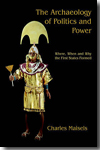The archaeology of politics and power
where, when and why the First Stated formed
- ISBN: 9781842173527
- Editorial: Osbow Books
- Fecha de la edición: 2010
- Lugar de la edición: Oxford. Reino Unido
- Encuadernación: Rústica
- Medidas: 23 cm
- Nº Pág.: 465
- Idiomas: Inglés

Using anthropology, archaeology and historical texts, this book sets out to discover three things about state formation: why did qualitatively different types of state emerge where and when they did; why did states form at all; what was the reason for their existence - or non-existence in the case of Indus civilization; and, what can this analysis tell us about the fundamentals of human nature and also about the behaviour of states today. All states are different, even now, even in Europe. They were even more different when they first emerged. Mesopotamia (Iraq) produced the earliest cities and the city-state, derived from large businesslike households organized around the temple as the gods' household.Egypt formed as a large territorial state from chiefdoms dominating villages. In China, which generated no city-states, the territorial state originated in the stratified clan dominated by aristocrats. The state arose in the Andes on a similar basis, that of the descent group. In northwest India, around the Indus river, an extensive, populous and complex society existed for half a millennium without state domination. How is the 'statelessness' of a large urban society to be explained? This work does so and in the process explains the origins of caste in India. Spanning the Andes and Egypt, the Levant and Mesopotamia, India and China, "The Archaeology of Politics and Power" provides insight into the deep history behind current affairs. This book will be of interest to students, teachers and researchers of political science and social science in general, as well as to those in anthropology, archaeology and history.






